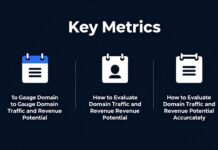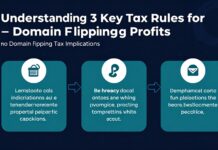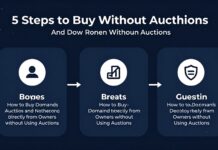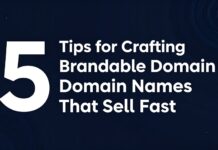In the ever-evolving digital landscape, spotting a valuable premium domain is crucial for any business aiming to boost its brand visibility and credibility. The right domain can set you apart from the competition, enhance your SEO efforts, and make your online presence more memorable. But how do you identify a domain that not only resonates with your target audience but also stands the test of time? In this article, we’ll delve into key strategies and tips that will help you uncover hidden gems in the domain marketplace.
First things first, consider the keyword relevance of the domain. A premium domain should ideally include keywords that reflect your business or industry, making it easier for potential customers to find you online. But it’s not just about the keywords; the domain length also plays a significant role. Shorter domains are typically easier to remember and share, which can lead to higher traffic and engagement. Are you also aware that the domain extension you choose can impact your brand’s perception? For example, a .com domain is often viewed as more credible and trustworthy.
Moreover, understanding the domain’s history is vital. Domains that have been previously owned may carry valuable backlinks or a certain level of authority. But beware of domains that come with a tainted past, as they may harm your SEO rather than help it. So, how do you navigate this complex domain landscape? Let’s explore the critical aspects of identifying a premium domain that not only complements your brand but also propels it to new heights.
7 Key Characteristics of Premium Domains That Elevate Your Brand Identity
Every entrepreneur or business owner know that a strong online presence is vital in today’s digital age. One of the key aspects of establishing that presence is having a premium domain name. Premium domains isn’t just a bunch of letters strung together; they hold significant value and can elevate your brand identity tremendously. But how can you spot a valuable premium domain that truly boosts your brand? Let’s dive into the 7 key characteristics that make a domain stand out and why they important.
1. Short and Memorable
In the world of domains, shorter is always better. Premium domains are often concise, making them easy to remember. For example, a domain like “Food.com” is far better than “BestRecipesInNewYork.com”. The shorter the name, the easier for customers to recall it. A research shows that domain names that are 6 characters or less have higher chances of being visited.
2. Keyword-Rich Domains
If your domain contains relevant keywords, it can boost your SEO efforts. For instance, “NewYorkPizza.com” not only tells users what the site is about, but also helps it rank higher in search results. Search engines, like Google, tend to favor domains that gives clear indication of the content. This characteristic is a big plus for businesses seeking visibility.
3. Brandable and Unique
A valuable premium domain should be brandable. A brandable domain is unique, and it stands out in the crowded online marketplace. Think of names like “Google” or “Amazon”. They aren’t just catchy; they are distinctive and easy to recognize. A good tip is to consider how the domain sounds when said out loud. If it rolls off the tongue easily, then it’s likely a good candidate.
4. Extinction of Hyphens and Numbers
When looking for a premium domain, it’s best to avoid hyphens and numbers. They can confuse customers and make it harder to find your site. For example, “Best-Pizza-Place.com” is less appealing than “BestPizza.com”. A clean, straightforward domain is more professional and trustworthy, which is crucial for building brand identity.
5. Established History
Domains that have an established history can be more valuable. This is because they may already have backlinks, traffic, and authority in their niche. A domain like “VintageCars.com” that has been online since 2005 will likely be more credible than a brand new domain. You can check a domain’s history using tools like Wayback Machine or WHOIS databases.
6. TLD Matters
Top-Level Domain (TLD) is also important. While .com is the most popular and generally the most respected, other TLDs can also work for specific niches. However, if you are trying to build a brand, sticking with .com is usually the best option. You should research which TLD resonates with your target audience.
7. Social Media Availability
A premium domain should be consistent with your social media handles. If your domain is “NewYorkBaker.com” but your social media handle is “NYBaker123”, this could confuse potential customers. Having a matching domain and social media handles makes it easier for users to find you across platforms. So, check that the social media accounts are available before you make a purchase.
Spotting a Valuable Premium Domain
When you are in the market for a premium domain, there are several things to keep in mind. Here’s a quick checklist:
- Is it short and easy to remember?
- Does it contain relevant keywords for your industry?
- Is it unique and brandable?
- Does it avoid hyphens and numbers?
- What is its established history?
- What TLD does it have?
- Are social media handles available?
By answering these questions you can filter through potential domains effectively.
Examples of Premium Domains
Let’s look at some examples of premium domains and what makes them valuable:
- Hotels.com: Simple, keyword-rich, and highly brandable.
- Insurance.com: Highly relevant and establishes authority in its niche.
- Travel.com: Short, memorable, and versatile for various travel services.
These domains not only represent their services directly, but also create strong brand identities that resonate with consumers.
Finding a premium domain can be challenging, but understanding these key characteristics will help you make an informed decision. Every detail counts when it comes to building a brand identity that stands out in the crowded digital landscape. So, keep these points in your mind next time you’re searching for a valuable domain that can truly elevate your brand.
Unlocking Digital Success: How to Identify the Most Profitable Premium Domains
Unlocking Digital Success: How to Identify the Most Profitable Premium Domains
In the ever-evolving digital landscape, the importance of a strong online presence can’t be overstated. Selecting the right premium domain could make or break a brand’s success. But, how do you know which domains are truly valuable? Knowing how to spot a premium domain that boosts your brand is key, especially in a bustling marketplace like New York. This article dives into identifying profitable premium domains, providing practical tips and examples.
What Makes a Domain “Premium”?
Premium domains typically have certain characteristics that make them desirable. These include:
- Short and Memorable: A domain that’s easy to remember is crucial. Shorter domains tend to be more valuable, as they are easier to type and share.
- Keyword Rich: Domains that include popular keywords related to your business can improve search engine rankings.
- Established History: A domain with a clean history and no negative SEO penalties is more appealing.
- Brandable Potential: The best domains have the potential to become strong brands.
Key Factors to Consider
When evaluating a premium domain, you should consider several factors that can impact its value:
Length: Shorter domains are generally seen as more valuable. For example, “car.com” is more valuable than “bestcarsintheworld.com.”
Extensions: The most popular domain extension is .com. However, other extensions like .net or .org can also hold value, especially in niche markets.
Traffic History: Look into the domain’s past traffic. A domain that has previously attracted visitors might have inherent value. Tools like SEMrush and Ahrefs can help you find this data.
SEO Factors: Domains that have good SEO metrics, like backlinks and domain authority, tend to be more valuable.
Market Trends: Stay updated on market trends; what’s valuable today might not be tomorrow.
How to Spot a Valuable Premium Domain
Identifying a premium domain that could elevate your brand involves a few steps. Here’s a simple checklist to follow:
Research Keywords: Use tools like Google Keyword Planner to find relevant keywords. A domain that includes a high-search keyword can be more valuable.
Evaluate Brand Fit: Does the domain align with your brand’s message? A domain that encapsulates your business ethos or service can resonate better with your audience.
Check Availability: Use domain marketplaces like GoDaddy or Namecheap to check if the domain is available for purchase.
Analyze Competition: Look at similar domains that competitors are using. This can give you an insight into what works in your industry.
Consider Future Growth: Think about the potential for expansion. A domain that allows for growth can be more valuable long-term.
Comparing Premium Domains
When you find multiple domains that catch your interest, compare them on different factors. Here’s a simple comparison table:
| Domain Name | Length | Keywords | Extension | Previous Traffic | Brand Potential |
|---|---|---|---|---|---|
| example.com | 7 | Yes | .com | High | Strong |
| example.net | 11 | No | .net | Moderate | Moderate |
| bestexample.org | 15 | Yes | .org | Low | Weak |
Real-Life Examples
Consider some high-value premium domains that have sold for millions.
Voice.com: Sold for $30 million in 2019, this domain exemplifies how a short, memorable name can hold immense value.
360.com: This domain fetched $17 million, showcasing the worth of a brandable domain in tech industries.
Insurance.com: Sold for $35.6 million, it highlights the importance of keywords in high-competition markets.
Final Thoughts
Navigating the world of premium domains can be daunting, but understanding what makes a domain valuable can ease the process. By conducting thorough research and evaluating your options based on the factors discussed, you can unlock digital success for your brand. Remember, a premium domain isn’t just a web address; it’s a critical component of your brand’s identity and online presence. So, take your time, analyze, and make the right choice!
The Ultimate Guide to Evaluating Premium Domains: What Every Entrepreneur Should Know
In the fast-paced world of online business, a premium domain can be a game changer for entrepreneurs. It’s often the first impression potential customers have of your brand and can greatly influence your visibility on the internet. But how do you evaluate a premium domain? What should every entrepreneur know about spotting one that can boost their brand? This guide aims to help you navigate the complexities of domain evaluation with some practical tips and insights.
Understanding Premium Domains
Premium domains are unique web addresses that typically have short length, keyword relevance, and high market value. They are often more memorable and easier to spell than regular domains. For example, the domain “bestcoffee.com” is likely to be considered premium, as it directly relates to a popular search term.
Key Features of Premium Domains
- Length: Shorter domains tend to be more valuable. They are easier to type and remember.
- Keywords: Domains that include popular keywords can enhance SEO and attract more traffic.
- Brandability: A good premium domain should be easy to brand. Think of names like “Google” or “Amazon.”
- Extension: .com domains are often the most desirable, but .net and .org can also hold value under certain conditions.
- Age: Older domains may have established authority and backlinks, which can be beneficial for SEO.
How to Spot a Valuable Premium Domain
Identifying a premium domain isn’t just about gut feeling; it involves analyzing various factors. Entrepreneurs should conduct thorough research and consider the following aspects.
Domain Age and History
A domain’s age can significantly affect its value. Older domains often have more credibility and can rank better in search engines. You can check a domain’s age using websites like WHOIS. If a domain has a clean history with no penalties, its value increases.
Keyword Relevance
Look for domains that contain keywords related to your business. This can help with search engine optimization (SEO) and make it easier for customers to find you. A domain like “affordableplumbing.com” is likely to attract more clicks than “plumbingservices123.com.”
Market Trends
Keeping an eye on market trends is crucial. If you see a rise in demand for a certain industry or niche, a premium domain in that area could be worth more. Use tools like Google Trends to assess what keywords are gaining popularity.
Evaluating Potential Value
When assessing a domain’s value, consider these factors:
- Comparable Sales: Research similar domains that have sold recently. This can provide a baseline for what you might expect to pay or earn.
- Traffic: If a domain already has organic traffic, it can be seen as more valuable. Tools like SEMrush can help analyze traffic sources.
- SEO Metrics: Check domain authority and backlink profiles using tools like Moz or Ahrefs. Strong metrics indicate a potentially valuable domain.
Practical Tips for Entrepreneurs
- Check for Trademarks: Ensure the domain isn’t infringing on any trademarks to avoid legal troubles.
- Consider Future Growth: Think about how the domain will fit into your long-term plans. Does it allow for expansion?
- Budget Wisely: Premium domains can be pricey. Set a budget and stick to it. Don’t let excitement cloud your judgment.
The Importance of Domain Extensions
Different domain extensions can impact the value and perception of a domain. Here’s a quick comparison:
| Extension | Value Proposition |
|---|---|
| .com | Most recognized and trusted |
| .net | Good for tech companies or networks |
| .org | Often used by non-profits and organizations |
| .io | Popular with tech startups and innovators |
Final Thoughts
When it comes to evaluating premium domains, understanding the underlying factors and market dynamics is essential for every entrepreneur. By considering elements like age, keyword relevance, and market trends, you can make informed decisions that better position your brand for success. Remember, a domain is not just an address; it’s a critical part of your brand identity. So, take the time to evaluate thoroughly and invest wisely!
Top 5 Mistakes to Avoid When Choosing a Premium Domain for Your Brand
Choosing a premium domain for your brand is like picking a name for a newborn. It’s gotta be unique, memorable, and fit just right with the identity you’re trying to build. But many people, they make some common mistakes while selecting a domain that could cost them dearly later on. So, let’s dive into the top 5 mistakes you should avoid when choosing a premium domain, while also learning how to spot one that can really boost your brand.
1. Ignoring Brand Relevance
One of the biggest mistakes is failing to consider how the domain relates to your brand. A catchy name that sounds good might not convey what your business does. For instance, if you’re selling organic skincare products, a domain like “BestSkincareProducts.com” wouldn’t be very helpful if you’re aiming for a premium feel. It should reflect your brand’s values and mission.
- Think about your niche: Is your domain relevant to the products or services you offer?
- Avoid generic names: Stand out with something unique that connects to your brand.
2. Overlooking SEO Potential
Many folks overlook the importance of SEO. A premium domain can serve as a valuable asset in your online presence. If it includes keywords relevant to your business, it can help with visibility in search engines. That said, it’s not just about the keywords; you also gotta consider how it sounds. An awkward combination of words might hurt more than help.
- Keywords Matter: If you can, include a keyword related to your business.
- Brand vs. Keywords: Balance between branding and SEO; you don’t want to sacrifice one for the other.
3. Choosing Lengthy Names
Long domain names are often difficult to remember and prone to typos. Imagine trying to tell a friend your website, and they can’t even spell it right. Shorter names are typically more effective. They’re easier to type, easier to remember, and they look better on marketing materials.
- Ideal Length: Aim for less than 15 characters.
- Memorability: The shorter, the better it sticks in people’s minds.
4. Not Researching Domain History
Thinking a domain is just a blank slate is a mistake. Some domains have a history, and not all of it is good. If a domain was previously used for spam or malicious activity, it can hurt your brand’s reputation. Tools like Wayback Machine or domain history checkers can help you understand what a domain has been used for before you buy it.
- Use Tools for Research: Check out domain history via sites like Archive.org.
- Google It: See what comes up when you search the domain name; past associations matter.
5. Failing to Consider Future Growth
When picking a domain, you gotta think long term. A name that works today might not suit your business in a few years. If you plan on expanding your product line or services, the domain should be broad enough to encompass those changes.
- Think Ahead: A domain like “NYCOrganicSkincare.com” may limit you if you expand nationwide.
- Flexibility: Choose a name that can grow with your business.
How to Spot a Valuable Premium Domain
So, how do you spot a premium domain that boosts your brand? Here’s some key points to consider:
- Short and Sweet: The shorter the domain, the higher its value.
- Keyword Rich: If it includes relevant keywords, it can be more valuable.
- Easy to Spell: Avoid tricky spellings; the easier it is to type, the better.
- Brandable: Does it sound like a brand? It should feel unique and catchy.
- No Hyphens or Numbers: These can confuse customers and are generally less desirable.
Key Differences: Premium vs. Regular Domains
| Feature | Premium Domains | Regular Domains |
|---|---|---|
| Length | Short and memorable | Often longer and complex |
| Brandability | Highly brandable | Less emphasis on branding |
| SEO Value | Higher potential for SEO | May lack keyword relevance |
| Market Demand | High demand and value | Lower demand |
| Price | Expensive, but worth it | Usually cheaper |
In the end, selecting a premium domain is a crucial step for your brand’s online identity. Avoiding these common mistakes and keeping an eye out for valuable features can make all the difference. Remember, your domain is often the first impression potential customers have of your business, so make it count!
Are You Choosing the Right Premium Domain? 10 Questions to Ask Before You Buy
Are you thinking about investing in a premium domain but unsure if it’s the right choice for your business? Premium domains can be a powerful asset, but not all domains are created equal. They can enhance your brand, improve your search engine ranking, and provide a level of credibility that is hard to achieve otherwise. However, choosing the right premium domain require some careful consideration. Here’s a checklist of 10 questions you should ask before making that important purchase.
1. What is the Domain’s History?
Understanding the history of a domain is crucial. Domains with a shady past can harm your brand. You can check its history through tools like the Wayback Machine or domain history services. Look for:
- Previous ownership
- Previous use (was it a legitimate business or spam?)
- Backlink profile (too many low-quality links can affect SEO)
2. How Memorable is the Domain?
A good premium domain should be easy to remember. Shorter domains tend to be more memorable, but consider how well it rolls off the tongue. Ask yourself:
- Is it easy to spell?
- Does it have a catchy ring?
- Can people easily recall it after hearing it once?
3. Does it Align with Your Brand?
Your domain name should reflect your brand’s identity. If you’re selling handmade crafts, a domain that sounds corporate might not fit. Think about:
- Your target audience
- The message you want to convey
- The overall tone of your brand
4. What Keywords are Included?
Incorporating relevant keywords can greatly enhance your SEO. Check if the premium domain contains keywords that are significant to your business. For example, if you run a bakery, a domain like “BestBakeryNYC.com” not only tells people what you do but also helps with search engine visibility.
5. Is it a .com Domain?
While there are many domain extensions available, .com is still the gold standard. It’s the most recognized and trusted by users. Consider:
- The perception of other TLDs (top-level domains) like .net or .co
- Whether your audience is likely to remember the extension
- The potential for confusion with similar domains
6. Has it Been Used Before?
An unused domain might seem like a good idea, but domains that have been used can have existing backlinks, which can be beneficial. However, if it’s been blacklisted or has a bad reputation, it can hurt your SEO. Ask:
- Has it been indexed by search engines?
- Are there any penalties associated with it?
- What was its previous purpose?
7. How Much Traffic Does it Get?
Analyzing the domain’s traffic can provide insights into its value. You may want to look into:
- Current traffic trends (is it increasing or decreasing?)
- The quality of that traffic (is it genuine or spam?)
You can use tools like SEMrush or Ahrefs to get this data.
8. What is the Price Range?
Understanding the pricing of premium domains is essential. Premium domains can range from a few hundred to millions of dollars. Reflect on:
- Your budget
- The potential ROI (return on investment) of the domain
- Similar domains in your niche and their pricing
9. Are There Legal Issues?
Before you buy, it’s important to ensure that the domain doesn’t infringe on any trademarks. You can do a quick search on the U.S. Patent and Trademark Office’s database. Consider:
- Potential legal disputes
- Trademark registrations that could conflict with your use
- The risk of having to change your domain later
10. How Easy is it to Transfer and Manage?
Make sure the domain can be easily transferred and managed. Some sellers might have restrictions. Look into:
- The seller’s reputation
- Transfer policies (is it straightforward?)
- Ongoing management fees
Additional Tips for Spotting a Valuable Premium Domain
When considering a premium domain, here are some practical examples and comparisons to keep in mind:
- Short vs Long: Short domains generally perform better, but sometimes longer domains can be more descriptive and relevant to your niche.
- Brandable vs Generic: A brandable domain is unique and sets you apart, whereas a generic one may have high traffic but less brand recognition.
Investing in a premium domain can be a game changer for your online presence. By asking these questions and doing thorough research, you can make an informed decision that will set your brand up for success. Remember, the right domain is not just about the name itself; it’s about how it fits into your overall branding and marketing strategy.
Conclusion
In conclusion, identifying a valuable premium domain involves evaluating several key factors: its length, keyword relevance, brandability, and extension. Short, memorable domains that contain popular keywords can significantly enhance your online presence and search engine visibility. Look for domains with a clean history, as a positive reputation can greatly impact your brand’s credibility. Additionally, consider the market trends and potential for future growth in your niche. As you embark on your search for the perfect premium domain, remember that patience and thorough research are essential. Don’t rush the process; a well-chosen domain can be a long-term investment that pays off significantly. Ready to elevate your online brand? Start exploring premium domain options today and secure a name that truly represents your vision and values!













